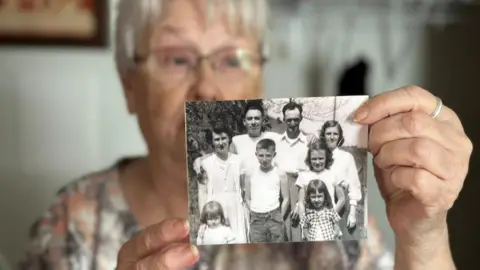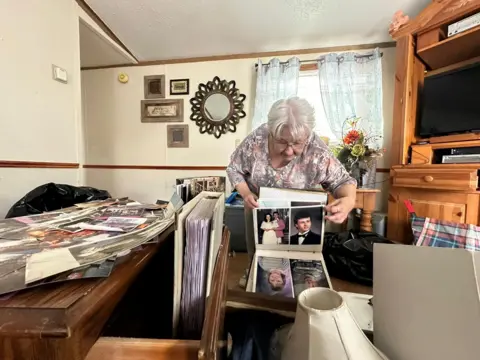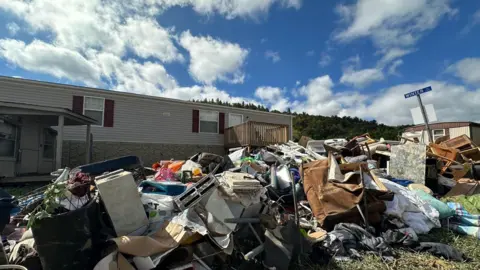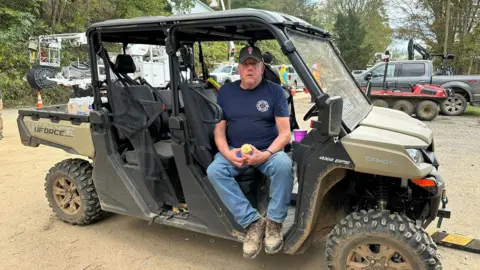 BBC
BBCDays after a tropical storm inundated parts of North Carolina with catastrophic flooding, leaving scores dead and hundreds more missing, entire communities are beginning to come to terms with devastating losses and, for some, narrow escapes.
For over 40 years, Nancy Berry’s trailer in the town of Boone was her mountain oasis and her family’s homestead.
It was where she created memories with family and friends, and where she preserved the memories of those lost. Her mother died in the same trailer.
But it took just a matter of hours for Hurricane Helene to wash it all away.
Now, the 77-year-old is trying to salvage what remains. On her bed, still soaked from the floods, she’s placed mementos of who she was, and where she came from.
On top of the pile, her son’s death certificate from when he died of Covid three years ago.
“I grabbed it and laid it out,” she told the BBC. “I’ve got to protect my family’s history. A lot of it is lost though.”

It was Ms Berry’s great-niece who saved her, helping her wade through three to four feet of water.
“They kept calling me – thank God for the cell phones. You never know, a long time ago, what would have happened,” Ms Berry recalled.
When her great-niece arrived, she found Ms Berry trying to save some of her belongings by putting them up high.
“Aunt Nanny. Come on. Get out. Get out,” she called out.
“I’m coming, I’m coming!” Ms Berry replied. She grabbed her purse, handing it to her great-niece, who carried it over her head while helping Ms Berry to safety.
“She’s strong and she was just pushing me, pulling and that water was – ,” Ms Berry, said, shuddering. “It was not a nice moment.”
Western North Carolina, located more than 300 miles (482km) from the ocean, is no stranger to storms, said Kathie Dello, a climate expert at North Carolina State University.
Six people died when a tropical storm caused “catastrophic” flooding in nearby Carusoe – but nothing like this, she said. At least 180 people are now known to have died. More than 600 are still unaccounted for. Thousands are without power, and fresh water supplies are dwindling.
The government has deployed 6,000 National Guard members and 4,800 federal aid workers to the region, but many have criticised the response, saying that the bulk of rescue efforts have been left up to volunteers.
“We were cut off from [the outside world] for about three days,” said Kennie McFee, the fire chief for Green Valley.
“Here, it was mainly neighbours helping neighbours.”

The cities of Boone and Asheville were hard hit, but remote communities located deep within the Appalachian Mountains are also seriously struggling, Diello told the BBC.
Even before the storm, mobile reception and Wi-Fi was patchy. Poverty and rough, rural roads have added to the difficulties people have faced getting out.
“A lot of times people say ‘well, why didn’t they leave?’,” Diello said. “Well maybe you can’t afford a tank of gas, and how many nights in a hotel in a safer place? Maybe you know you can’t leave your family, maybe you can’t leave your job.”
In Green Valley, a woman, who did not want the BBC to use her name, said that five days after the storm she still had no power and no communication with the outside world.
Her only functioning device was a battery powered antenna radio that she said was decades-old.
“If you’re raised in the mountains, you’ll cope,” she said.
While talking with the BBC, a car pulled up to bring her news of her family, who she hadn’t seen or heard from since the storm hit.
“They were all okay, another thank you, Lord,” she said.
Although she recalled bad storms, she said she’s never seen anything like Helene.
“God is getting people’s attention. He really is getting people’s attention, not just here, but it’s everywhere,” she said. “But I really think it’s just, it’s to let us know who’s in control.”

Nicole Rojas, 25, moved to her remote home up the mountain in Vilas, North Carolina not long ago from nearby Tennessee, where she had lived, in her own words, “off grid”.
“I kind of wish I would have stuck to my lifestyle a little bit, because I always had drinking water, showering water, food,” she told the BBC, while looking for supplies in Boone.
Now, she and her roommates, who include a 54-year-old woman named Karen, Karen’s 74-year-old mother and a family with young children, will likely be without power for weeks, she heard, with the only way in and out a single-lane, tree-strewn road.
“The only reason I was even able to step out was from the gentlemen in the community taking out their chainsaws and their tractors and moving all the trees,” she said.
Ms Rojas had been at home on Friday, when the storm struck the mountain. On Sunday, after her neighbours spent all of Saturday clearing the road, she and Karen ventured out to town. Karen, who amid the chaos of the storm had suffered a life-threatening allergy attack after being stung by an insect, brought supplies back to their house.
Ms Rojas, meanwhile, stayed in Boone with friends, so that she could go to work at a local healthstore. She plans to return home, with more supplies, on Wednesday.
It was at work when it all finally hit her, after hearing the story of another customer.
“She had to drive by a truck that was picking up, that had like, dead bodies on there, and she started crying,” she recalled. “And that’s when I just broke down.”
“You hear everyone’s horror stories about how, like, literally their entire house just slid down the mountain.”
“I feel like I just survived the apocalypse.”


